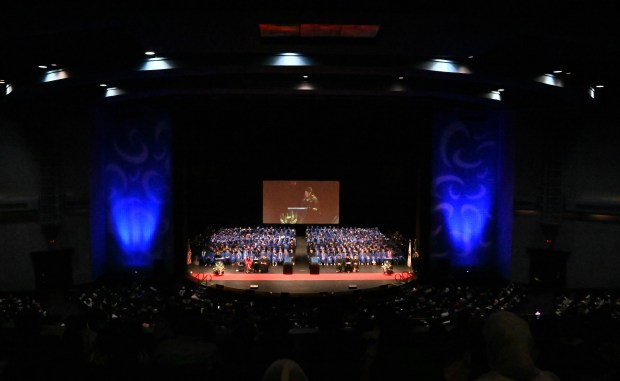Few crimes are ever easy to prosecute, but crimes involving human trafficking are often the most difficult, Porter County Prosecutor Gary Germann said.
Most times, there’s only one witness to the crime — the victim — and they’re often terrified to talk about what happened, said Germann, a panelist during the Safe Coalition for Human Rights annual gala at the Indian Cultural Center in Merrillville Tuesday night. And then when they do, they have to relive their trauma over and over, which is daunting.
But Germann, who’s been Porter County’s top prosecutor since 2018, loves the work and does the best he can with what he gets.
“Let’s face it: The criminal justice system isn’t user-friendly, so there are depositions and discovery, and after all that, the victim has to testify in front of 12 strangers,” he said. “I often meet with the victim seven or eight times before trial, and we try to make them comfortable and earn their trust. We have to present their story to the jury with no stones unturned, because that’s what juries expect now. (Human trafficking) cases are much more difficult than murder cases.”
That’s why people don’t hear often about human trafficking cases getting prosecuted, Assistant U.S. Attorney for the Northern District of Indiana Thomas McGrath added. That doesn’t mean prosecutors’ hands are completely tied, however.
“There’s a misconception that human trafficking is always forced or violent; there’s also fraud involved. So, if you don’t see a trafficking conviction, it’s not happening, but we’ll find a different way to prosecute,” McGrath said. “There’s a lot of pressure on being a victim, so doing it that way helps them move on.”
State Representative Earl Harris Jr., D-East Chicago, asked the first of two panels presented at the gala what legislators could do to help law enforcement with its human trafficking efforts. While Germann said Indiana’s laws are “sufficient,” Porter County Sheriff Jeff Balon had an important ask.
“Money,” he said to laughter from the 300-plus member audience. “I mean, honestly, it takes a lot to train officers on spotting trafficking and then supporting victims; once they leave whatever shelter, what do they do? How do we break the cycle into that lifestyle?”
Places like Ashley’s House, which provides housing for adult women who’ve been victims of trafficking and their children, are crucial in teaching them new ways to survive and thrive, but getting buy-in from communities is often a tough sell. The Hobart City Council, for example, recently unanimously rejected a home similar to Ashley’s House because a resident wrote a letter saying that victims “don’t stay on the path” of trauma recovery, so they don’t want that risk in their neighborhood.
Retired Rev. Charles Strietlmeier, who works with SafeCHR and petitioned the city for the home at 1359 State Street, said he hopes to come back to the city with a compromise for the home.
Keynote speaker Moses Farrow presented during the second panel of the evening a different form of trafficking that, like labor trafficking, people might not recognize: Adoption. Farrow, who was born with cerebral palsy in South Korea, was adopted by actress Mia Farrow in 1980, when he was two.
One would think he’d “hit the lottery” of wealth and comfort, but Farrow abused him and some of his other adopted siblings, he said. Unwinding himself from the abuse, as well as two of his siblings dying by suicide, inspired him to become a therapist specializing in adoption trauma.
“I wanted to dispel the stereotypes of ‘celebrity privilege,’ and I needed to open my eyes to the truth: the business of adoption,” he said. “Adoption is a huge industry, and it doesn’t matter whether you’re given to the worst of the worst families or the best of the best, because there’s still one thing in common: The child is taken away from their family.”
The first panel agreed that people should pay attention when young people appear to be afraid to speak; if they’re unusually upset when their phones get taken; if they wear clothing they otherwise wouldn’t wear at home; if they leave school at odd hours; or if they have older significant others, because those things could be signs of trafficking.
For more information on how to donate to Ashley’s House, log on to www.safechr.org.
Michelle L. Quinn is a freelance reporter for the Post-Tribune.




